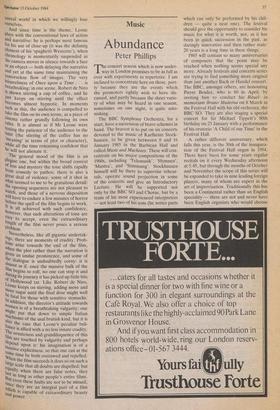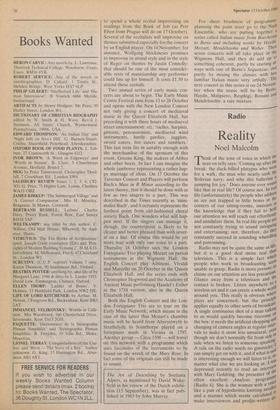Music
Abundance
Peter Phillips
The concert season which is now under- 1. way in London promises to be as full as ever with experiments in repertoire. I am inclined to concentrate here on those, part- ly because they are the events which the promoters rightly wish to have dis- cussed, and partly because the sheer varie- ty of what may be heard in one season, sometimes on one night, is quite asto- nishing.
The BBC Symphony Orchestra, for a start, have a succession of brave schemes in hand. The bravest is to put on six concerts devoted to the music of Karlheinz Stock- hausen, to be given betweeen 8 and 16 January 1985 in the Barbican Hall and called Music and Machines. These will con- centrate on his major compositions of the 1960s, including `Telemusik', 'Mantra', and `Stimmung'. Stockhausen himself will be there to supervise rehear- sals, operate sound projection in some of the concerts and give an Introductory Lecture. He will be supported not only by the BBC SO and Chorus, but by a team of his most experienced interpreters — not least two of his sons (he writes parts
which can only be performed by his chil- dren — quite a neat one). The festival should give the opportunity to consider his music for what it is worth, not, as it has been in quick succession in the past, as daringly innovative and then rather stale: 20 years is a long time in these things.
1985 will contain so many anniversaries of composers that the point may be reached when nothing seems special any more. Already festivals and concerts series are trying to find something more original than just another Bach or Handel concert. The BBC, amongst others, are honouring Pierre Boulez, who is 60 in April, by inviting him to conduct his Rituel: in memoriam Bruno Madema on 8 March in the Festival Hall with his old orchestra, the BBC SO. They are also staging a special concert for Sir Michael Tippett's 80th birthday on 25 January with a performance of his oratorio 'A Child of our Time' in the Festival Hall.
A rather different anniversary, which falls this year, is the 30th of the inaugura- tion of the Festival Hall organ in 1954. There have been for some years regular recitals on it every Wednesday afternoon at 5.45, but through the months of October and November the scope of this series will be expanded to take in nine leading foreign players, many of whom are expert in the art of improvisation. Traditionally this has been a Continental rather than an English speciality — there are not and never have been English organists who would choose to spend a whole recital improvising on readings from the Book of Job (as Petr Eben from Prague will do on 17 October). Several of the recitalists will improvise on themes submitted especially for the concert by an English player. On 14 November, for instance, Wolfgang Stockmeier promises to improvise in atonal style and in the style of Reger on themes by Justin Connolly: that should be one of the most consider- able tests of musicianship any performer could line up for himself. It costs £1.50 to attend these recitals.
Two annual series of early music con- certs are about to begin. The Early Music Centre Festival runs from 13 to 28 October and opens with the New London Consort not only giving a concert of mediaeval music in the Queen Elizabeth Hall, but preceding it with three hours of mediaeval street entertainment: viz. 'vielles, harpists, gitterns, percussionists, mediaeval wind instruments, hurdy gurdies, jugglers, sword eaters, fire eaters and tumblers.' This last item fits in suitably enough with the merchandise of the sponsors of this event, Greene King, the makers of Abbot and other beers. In fact I can imagine the whole jamboree representing a rather hap- py marriage of ideas. On 17 October the Taverner Consort and Players will perform Bach's Mass in B Minor according to the latest theory, that it should be done with as few as two singers to a part. This was described in the Times recently as 'mini- malist Bach', and it certainly represents the furthest point from old-fashioned choral society Bach. One wonders what will hap- pen next. If the singers can manage it, though, the counterpoint is likely to be clearer and better phrased than with sever- al on a line. Of course this would be yet more true with only one voice to a part. Thursday 18 October sees the London Fortepiano Trio playing Mozart on period instruments at the Wigmore Hall; the English Concert play Albinoni, Vivaldi and Marcello on 20 October in the Queen Elizabeth Hall; and the series ends with Christopher Hogwood and the Academy of Ancient Music performing Handel's Esther in the 1718 version, also in the Queen Elizabeth Hall.
Both the English Concert and the Lon- don Fortepiano Trio are to tour on the Early Music Network; which means in the case of the latter that Mozart's chamber music will be heard from Aberystwyth to Strathclyde to Scunthorpe played on a fortepiano made in Vienna in 1797. Another group — Circa 1500— will travel on this network with a programme which uses fascimiles of the instruments to be found on the wreck of the Mary Rose. In fact some of the originals can still be made to sound. For sheer brashness of programme' planning the palm must go to the Nash Ensemble, who are putting together. a. series called Italian music from Boccherint to Berio and including works by Haydn, Mozart, Mendelssohn and Weber. Then seven concerts will all take place in the Wigmore Hall, and they do add up t° something coherent, partly by starting al- ways with one of Berio's Sequenzas, and partly by mixing the classics with less familiar Italian music very artfully. The next concert in this series is on 24 Novera' ber when the music will be by Berle, Haydn, Malipiero, Resphigi, Rossini and Mendelssohn: a rare mixture.























































 Previous page
Previous page